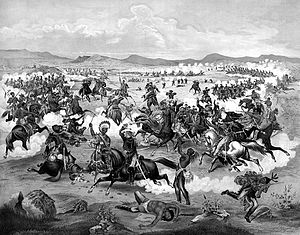Sioux War
| Sioux Wars | |||||||
|---|---|---|---|---|---|---|---|
| Part of the American Indian Wars | |||||||
 "Custer's Last Stand" during the Battle of Little Bighorn in 1876. Like most battles between the Lakotas and the U.S. Army, it took place on ground not recognized as Lakota territory. (The battle stood in the Crow Indian Reservation). |
|||||||
|
|||||||
| Belligerents | |||||||
|
Allies: |
Allies: |
||||||
| Commanders and leaders | |||||||
|
Plenty Coups (Crow) (?) Alligator-Stands-Up (Crow war-chief) Washakie (Shoshone chief) |
Little Crow Red Cloud Crazy Horse † Sitting Bull Black Kettle † |
||||||
Allies:
Allies:
The Sioux Wars were a series of conflicts between the United States and various subgroups of the Sioux people which occurred in the later half of the 19th century. The earliest conflict came in 1854 when a fight broke out at Fort Laramie in Wyoming, when Sioux warriors killed several American soldiers in the Grattan Massacre, and the final came in 1890 during the Ghost Dance War.
The First Sioux War was fought between 1854 and 1856 following the Grattan Massacre. The punitive Battle of Ash Hollow was fought in September 1855.
The Santee Sioux or Dakotas of Western Minnesota rebelled on August 17, 1862 after the Federal Government failed to deliver the annuity payments that had been promised to them in the Treaty of Traverse des Sioux of 1851. The Indians pillaged the nearby village of New Ulm and attacked on Fort Ridgely. They killed over 800 German farmers, including men, women and children. After the Battle of Birch Coulee on September 2, the Indians were eventually defeated on September 23 in the Battle of Wood Lake.
Most of the warriors who took part in the fighting escaped to the west and north into Dakota Territory to continue the conflict, while the remaining Santees surrendered on September 26 at Camp Release to the US Army. In the following murder trials 303 Indians were sentenced to death. After closer investigation from Washington, eventually 38 were hanged on December 26 in the Town of Mankato in America's largest mass-execution.
...
Wikipedia
